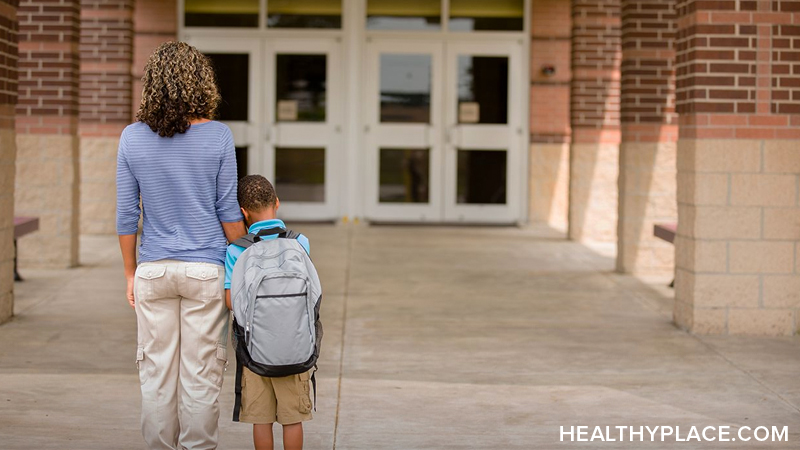How Do You Discipline a Child for Misbehaving in School?

Determining how to discipline a child for misbehaving in school is something that most parents hope they never have to do. However, for kids, part of school involves learning how to behave in such a structured setting, how to get along well with others, and how to do the myriad of things that are expected of them every day. Considering this from a child’s perspective, adults just might realize how difficult it is to behave perfectly in every school situation. That doesn’t mean that you shouldn’t hold kids accountable for their misbehavior. To thrive, kids need to learn proper behavior. How you discipline your child for misbehaving in school influences their success.
How to Discipline a Child for Misbehaving at School: Start at the Source
Your child’s teacher reports that your son or daughter is getting into trouble and must be disciplined (appropriately, to discipline means to teach). It’s most effective when the discipline is centered on the place where behavior is a problem. You’ll reinforce actions at home, of course, but start the process at the school.
Develop a positive working relationship with your child’s teacher and other school personnel. Stopping a child’s misbehavior in school is most effective when the adults in their lives are on the same team working toward the good of the child.
To establish a good parent-teacher-school relationship, when the teacher first contacts you about your child, believe them. Listen fully and openly to their descriptions and reports about what’s happening with your child, and interact respectfully. Being defensive and argumentative makes the situation worse for everyone, including your child. This doesn’t mean, however, that you must accept everything the teacher says. If you have reason to believe the reports are inaccurate, have a calm, respectful talk with the teacher.
An excellent way to foster a positive relationship with the school is to be present. Volunteer in your child’s classroom or in other capacities in the school. Your presence shows your child you support them and that education is important to you. It shows the school, too, that you support their efforts to educate kids (including yours).
How Do You Discipline a Child for Misbehaving in School? Know Your Child
Understand your child deeply. You already know them at home, but kids are often different people at school. Having a positive working relationship with the teacher and volunteering in the classroom are very helpful in understanding your child’s school behavior.
Look beyond the misbehavior to uncover what fuels it:
- Does your child feel left out?
- Are they behind in their schoolwork and struggling to keep up?
- Are they under-challenged?
- When they act up at home, what’s the reason? Hunger? Exhaustion? Need for physical activity? These can provide clues to what drives school misbehavior and point to simple fixes.
- What works to redirect your child?
- What doesn’t work but makes things worse?
If kids are struggling in any way at school, they are at risk of frustration, boredom, anxiety, and depression—any of which can cause behavior problems. Some detective work to discover what’s happening is an important part of how to discipline your child for misbehaving at school.
Once you’ve deepened your understanding of your child and the situation at school, you can create a plan to replace misbehavior with cooperative, productive behavior.
Disciplining a Child Who Misbehaves at School: Positive Action
A child’s behavior can’t improve without purposeful action from parents and school alike. A concerted effort works best. Be consistent and form a united front regarding behavior expectations for your child.
At home, uphold classroom rules, such as walking rather than running or using an inside voice. Provide incentives at home to reinforce good school behavior. Focus on rewarding what your child is doing right, but do have logical consequences in place for misbehavior. You and your child’s teacher might decide that for breaking a given rule, your child will lose a privilege. Following through at home is a positive way to discipline a child for misbehaving at school.
Other tips for helping your child behave better at school include:
- Listen fully to your child to hear their whole story without judging.
- Keep your emotions out of it. Remain calm and connected to your child and the school, and work together to move forward.
- Provide emotional support for your child.
- At home, brainstorm good choices and practice acting them out.
- Avoid punishing as it reinforces negative emotions and behaviors.
It’s anxiety-provoking to received calls from the school informing you that your child is in trouble. Knowing how you discipline a child for misbehaving in school can reduce your parental worries as it increases your child’s positive behavior.
See Also:
APA Reference
Peterson, T.
(2022, January 11). How Do You Discipline a Child for Misbehaving in School?, HealthyPlace. Retrieved
on 2026, January 10 from https://www.healthyplace.com/parenting/discipline/how-do-you-discipline-a-child-for-misbehaving-in-school



